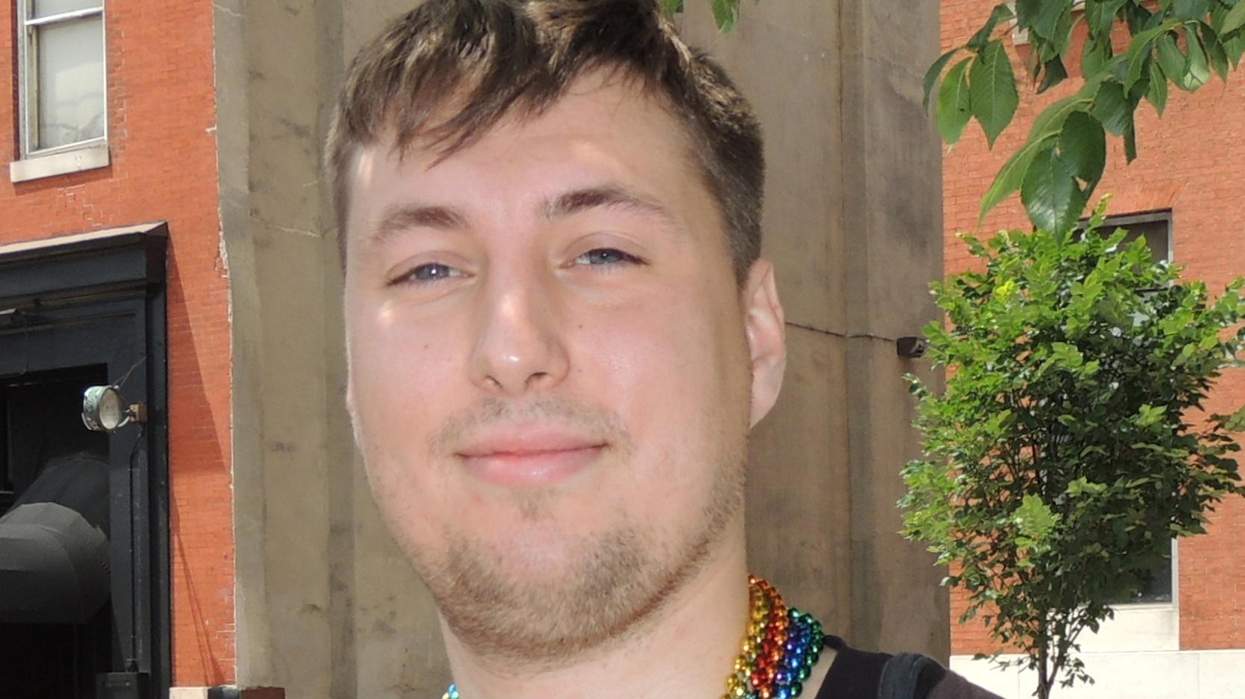For Bogdan Globa, founder and executive director of Tochka Opory|Fulcrum, an LGBT rights advocacy organization in Ukraine, the dream of celebrating LGBT Pride the way he saw it done in America seems farther away than ever following the cancellation of Kiev's March for Equality last week.
Yet this young gay activist remains determined and optimistic in a country he sees as intoxicated with machismo after having stood up to its behemoth neighbor to the north, Russia. However, that bravado is making it harder than ever to be an LGBT Ukrainian.
Globa, whose organization includes a project similar in mission to PFLAG called TERGO, and his mother, Olena Globa, visited the U.S. in 2013. While in America, mother and son marched in Baltimore's Pride parade.
That experience led Globa to hope he and his colleagues back home in Ukraine could successfully fight for freedom and equality for LGBT people in the nation. He is involved in helping establish and grow what he and his peers hope will someday become an annual LGBT Pride celebration in Kiev.
Unwilling to be discouraged by the demise of Kiev's 2014 March for Equality, Globa recently took time to answer a few questions for The Advocate about this year's failed attempt to build on last year's modest Pride event in his country's capital city. His answers shed light on the depth of the challenges facing LGBT people in Ukraine, despite the new government's professed desire to achieve Western European-style respect for human rights.
The Advocate: Was the event Saturday supposed to have been the second annual Pride event in Kiev?
Bogdan Globa: In fact, this was the third attempt. The first March for Equality was planned in 2012, but it also failed because of lack of security. Then about 3,000 radical activists arrived on the site of the Pride march. Last year LGBT activists managed to march 300 meters guarded by numerous border police and internal troops -- about 1,000 police officers. This year the police refused to defend participants in the march.
What are your feelings about the cancellation?
For me, it was an expected decision. I believe that the organizers of the Pride rushed to announce about it. The situation in Ukraine and in Kiev is highly radicalized -- there are too many ... groups interpreting LGBT as an enemy and the number of attacks on the LGBT community has now been increased. At the same time, our police are very weak after the revolution and demoralized by the events in the east. Moreover, I guess it was an exam for our new government. I heard homophobic comments from our officials, particularly from so-called liberal [Mayor Vitali] Klitschko. I believe that our government failed the exam on an understanding of what democracy is.
What is life like in Kiev and Ukraine for LGBT people in general?
Dangerous. Now it has been becoming even more dangerous. All expected the situation after the revolution of dignity would get better, but I think that on the contrary, people have become more aggressive and radical groups gained the trust of ordinary people. Now it is fashionable to be a strong, courageous, masculine man in Ukraine.
Do you fear that this unwillingness by police and city officials to support and protect the March for Equality is contrary to the stated goal to be more European and Western in terms of values?
The police realized that they have no power to protect the participants of the event. I understand their position. There is a real and objective reason. At the same time, I believe that the administration could make a more valid claim by saying something like, "We support human rights and the right to peaceful assembly but cannot ensure the security of the participants and therefore have to ask about cancellation of the event." Instead, the administration and Mr. Klitschko made a quite homophobic statement and accused the LGBT community of the provocation. I feel sad.
Is there a sense that Americans and Europeans will not continue to support a government that seems unwilling to protect its LGBT population?
It depends. This would be great policy, but Ms. [Angela] Merkel [Germany's chancellor] is not concerned with LGBT rights. As for the White House, I'm not sure. I sincerely hope that they will pay attention to it. Although on the background of the Cold War with [Russian president Vladimir] Putin, LGBT rights issues seem unimportant. I think the situation [is that] ordinary LGBTs will be pawns [and] larger political games will continue. And no one realizes that throwing a "hot potato" to each other on Twitter by the two administrations leads to the fact that ordinary LGBTs face ... aggression every day. But who cares?
Just to clarify, is Kiev Pride 2014 and March for Equality the same organization?
Sure.
How many members does TERGO have and how hopeful are you about growing support for you mission?
Active and supportive are about 20. I am sure that the moment of the truth has come. More and more LGBT people are coming out. More and more people start realizing the objectivity of homosexuality. Parents who usually have one or two children don't have much choice: to accept the peculiarity of their children or to face lonely aging. TERGO may facilitate and speed up the process of acceptance which may be very painful when you are all by yourself with the problem. The challenge is what form this movement may [take] under the circumstances of real war and economic stagnation as the aftermath.




































































Charlie Kirk DID say stoning gay people was the 'perfect law' — and these other heinous quotes